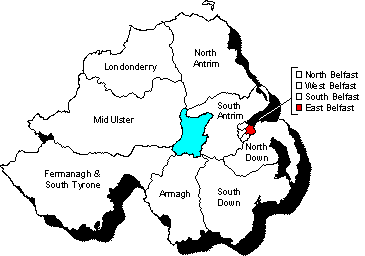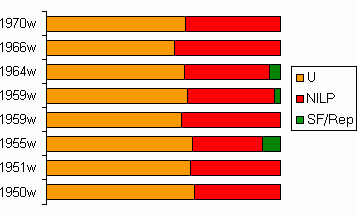

 |

|
|
|
|
|

|

|
| Map and diagram by Conal Kelly | |
Established in 1920, this constituency consists of the eastern quarter of the city of Belfast. Between 1950 and 1970 the constituency was represented by two different MPs, both of whom were Unionist. The longest serving of these was Stanley McMaster who was first elected in the 1959 by-election and continued to represent the constituency until his defeat in 1974. All elections held during this period were contested. The constituency recorded the highest turnout in the 1959 general election.
See also election results for East Belfast 1973-1982, 1983-1992 and 1993-2007.
| U | NILP | SF/Rep | |
| 1970w | 59.5% | 40.5% | |
| 1966w | 54.7% | 45.3% | |
| 1964w | 58.8% | 36.9% | 4.3% |
| 1959w | 60.1% | 37.2% | 2.7% |
| 1959w-b | 57.8% | 42.2% | |
| 1955w | 62.5% | 30.2% | 7.3% |
| 1951w | 61.7% | 38.3% | |
| 1950w | 63.3% | 36.7% |
Unionist majority: 8,519; electorate: 59,524; votes cast: 75.7%
In this, his
penultimate Westminster contest, McMaster once again squared off
with the NILP. Having polled very well in 1964, the NILP had high
expectations of making a breakthrough and had selected one of their
highest profile members, David Bleakley, as their candidate. However,
in the face of a rapidly changing political environment (and on a
higher turn-out), the NILP's share of the poll dipped and McMaster
was returned once more.
Bleakley had previously unsuccessfully contested the Northern Ireland
House of Commons constituency of Victoria (Belfast) in the 1949 and
1953 elections. He was finally elected to Stormont in 1958 and
represented Victoria until losing his seat in 1965. He was appointed
Minister for Community Relations in 1971 by Prime Minister Brian
Faulkner (despite not being an MP at the time), becoming the only member of the
NILP to serve in government. He again unsuccessfully contested East
Belfast for the February and October Westminster elections of 1974.
He represented East Belfast in the Assembly (1973-74) and the
Constitutional Convention (1975-76). He also unsuccessfully contested
the 1979 European Parliamentary election as an Independent and the
1982 and 1998 Assembly elections in East Belfast as an Independent Labour candidate.
Unionist majority: 3,633; electorate: 57,077; votes cast: 68.2%
The incumbent
McMaster once again defended his seat in the general election of 1966.
His sole competition once more came from the NILP, fielding a new
candidate, Robert McBirney. McBirney polled extremely well, capturing
over 45% of the vote and giving the NILP their best ever result in a
Westminster election. His majority slashed to just over 3,600 votes,
McMaster had done enough to be returned to Westminster for a fourth
term.
In September 1974, Robert Martin McBirney, then a Resident Magistrate,
was shot and killed by the IRA in his Belfast home.
Unionist majority: 9,249; electorate: 58,196; votes cast: 72.5%
McMaster seeking a third successive victory faced two new opponents in the 1964 election. The NILP were once again contesting the constituency with a new candidate, Samuel Watt. David McConnell was standing on a Republican abstentionist ticket (Sinn Fein now being a proscribed organization). In the end McMaster successfully defended his seat, although with a slightly reduced majority.
Unionist majority: 10,098; electorate: 58,663; votes cast: 75.2%
Having been elected in a
by-election just seven months earlier, the newest Unionist MP, Stanley
McMaster, was back on the hustings defending his seat. By-election candidate
James Gardner was again representing the NILP and Sinn Fein nominee, Barney
Boswell, rounded out the field. In the end, McMaster successfully defended his
seat for the first time, almost doubling his majority in the process.
The NILP candidate, James Gardner, would later unsuccessfully contest the Northern
Ireland House of Commons by-election for Mid-Down in 1964.
Unionist majority: 5,260; electorate 58,388; votes cast: 57.9%
This by-election was caused by the death of the incumbent, Alan McKibbin, who had represented the constituency since 1950. Stanley McMaster, a London based barrister, was nominated as the Unionist candidate. Following Tom Boyd's successful election to Northern Ireland House of Commons, the NILP selected a new candidate in East Belfast, namely James Gardner. Gardner polled well capturing over 42% of the vote but the Unionist candidate was victorious with a majority of 5,260.
Unionist majority: 13,897; electorate: 61,258; votes cast: 70.4%
Seeking a third
consecutive term, the incumbent McKibbin once again defended his seat
in the 1955 general election. His opponent contesting the seat for the
fourth time was once again the NILP's Tom Boyd. This election also came
at a time of increased militant republican activity. In October 1954 the
IRA had attempted a raid on Omagh Barracks in order to capture weapons
for their planned Operation Harvest. The raid was a failure and led to
the capture of eight IRA members. One of those captured and imprisoned
for his part in the raid was Liam Mulcahy. Mulcahy was subsequently
selected to represent Sinn Fein in East Belfast. The presence
of a third candidate did not alter the result and McKibbin was returned
for another term and with an increased majority. Contesting only three
seats in 1955, this was the NILP's best result of the election.
Boyd had stood unsuccessfully for the Northern Ireland House of Commons in
1953 (Pottinger). He was finally elected for Pottinger in 1958 and also
became leader of the Northern Ireland Labour Party following his victory.
Unionist majority: 10,971; electorate: 62,798; votes cast: 74.5%
The incumbent McKibbin again squared-off with his NILP opponent Tom Boyd, in a repeat of the 1950 general election. Once again the result was the same with McKibbin topping the poll although on a slightly reduced majority of just under 11,000.
Unionist majority: 12,506; electorate: 61,561; votes cast: 76.6%
The incumbent Thomas
Cole did not seek re-election in 1950. He was replaced on the ballot by Unionist
Alan McKibben. His sole opponent was Tom Boyd, representing the NILP. Boyd had
contested East Belfast in 1945 and had secured almost 44% of the vote. East
Belfast represented one of the NILP's best chances at taking a seat and
expectations were running high. In the end the NILP vote slipped below their
1945 levels to 36.7% and McKibbin was elected with a majority of over 12,000.
Boyd had also stood unsuccessfully for the Northern Ireland House of Commons in
1938 (Victoria) and 1949 (Bloomfield).
See also:
Results from 1950 to 1970 for each seat: East Belfast | North Belfast | South Belfast | West Belfast | North Antrim | South Antrim | Armagh | North Down | South Down | Fermanagh and South Tyrone | Londonderry | Mid Ulster
Other sites based at ARK: ORB (Online Research Bank) | CAIN (Conflict Archive on the INternet) | Northern Ireland Life and Times Survey
Your comments, please! Send an email to me at nicholas.whyte@gmail.com.
Conal Kelly, 1 June 2007.
|
Disclaimer:©
Nicholas Whyte 1998-2004 Last Updated on Wednesday, 12-Jan-2005 12:12
|